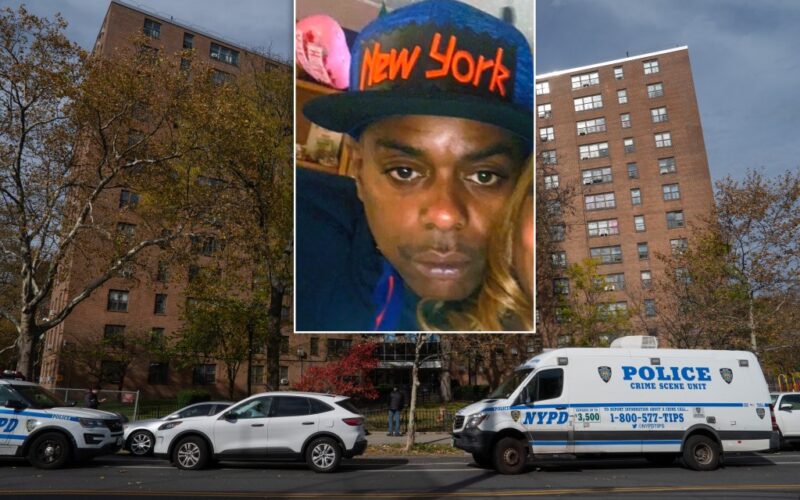After killing his family in a mystifying explosion of violence, Kaseem Stukes wandered through his building in the Castle Hill Houses in the Bronx with two guns tucked in his waistband, saying cryptic farewells to neighbors and leaving clues that offer the first insight into a possible motive for the horrific triple-murder suicide.
“My family is snitching on me,” he told a childhood friend who lives down the hall from his apartment.
“They’re telling on me.”
On the day of the massacre, Stukes was due to appear in Bronx Criminal Court on gun possession and reckless endangerment charges that were hanging over his head. It’s unclear if he knew it at the time, but the Bronx district attorney’s office was planning to move to dismiss charges against him for the Sept. 14, 2024, incident, in which he was accused of slamming his vehicle into a row of parked cars and firing a gun at an angry mob.
“He was in his socks. He was real sad,” said the friend, who would only identify himself as Javier. “He gave me a big hug. He said, ‘I’m sorry, man. It’s bad, real bad. You’re not going to see me anymore.’ He tried to give me his debit card for my kids.”
Moments earlier Stukes had gunned down his mother, daughter and the young woman’s boyfriend. Alerted by worried family members, police found Stukes dead near the couch, his gun still in his hand. His 75-year-old mother, Theresa Stukes, and his 26-year-old daughter, Kianna Stukes, a health care worker, were found dead in the rear of the apartment. Kianna’s boyfriend, 33-year-old Andrew Reynoso, was dead near the home’s front door.
Courtesy of family
Kaseem Stukes (front) is pictured with (left to right) his daughter Kianna Stukes, his mother Theresa Stukes and his sister Tangier Stukes. On Wednesday, Kaseem fatally shot Kianna and Theresa, along with Kianna’s boyfriend, before killing himself. (Courtesy of family)
Relatives who spoke to the News said there were indications Kaseem had suffered from a mental illness.
“He was depressed and paranoid. He was afraid of going back to jail. He said the cops are trying to frame him,” said Sha Hopkins, a 41-year-old cousin who Stukes called after he’d killed his family.
She said that his mental health had been deteriorating for some time.
“He said he was having negative thoughts. We didn’t know it was a cry for help,” she said.
When he called Hopkins that morning, “he told me he was sorry,” she recalled. “He was remorseful. He didn’t say what he had done, but said he was sorry, so sorry,” said Hopkins, who works as a florist. “He loved his family and never in a million years did we think he would ever hurt his family.”
“Our family is suffering this great loss,” she added. “We lost three generations in one day.”
After the carnage, as he wandered the halls, Kaseem had two pistols jammed in his waistband, Javier recalled.
“(He had) one little gun and one big gun,” Javier recalled.
“Trust me. I don’t need nothing,” Stukes told him. “You’re never going to see me again.”
“I said, ‘Come inside. Come inside.’ But he walked away.
“About 20 minutes later, I heard a pop, one pop,” Javier said, as Stukes took his own life.

Courtesy of family
Theresa Stukes, 75. (Courtesy of family)
After he killed his family, Stukes reached out to his 20-year-old son in North Carolina.
“Check on your family,” he told his son in a chilling voicemail, cops said. Other relatives he reached were immediately worried and reached out to close friends and family to check on the apartment. Cops were called to the scene about 9:45 a.m., around 90 minutes after Stukes’ call to his son.

Barry Williams/ New York Daily News
Employees of the Office of the Medical Examiner remove a body from a triple murder and suicide at the Castle Hill Houses in the Bronx on Wednesday. (Barry Williams/ New York Daily News)
Stukes has a well doumented criminal history.
In 2003, he was arrested for selling cocaine and crack outside a NYCHA complex. He was convicted and sentenced to eight years in prison.
Ten years later, while out on supervised release, he was arrested for tossing a gun from a car window while driving recklessly to flee police. He ultimately pleaded guilty and was sentenced to three years in prison.
The episode he was due in court to appear over happened in 2024. Kaseem managed to flee the scene of a car crash, but cops arrested him in May, charging him with gun possession and reckless endangerment. After he claimed he pulled the weapon to defend himself and the gun went off accidentally, a grand jury failed to indict him on the charges, a law enforcement source said.
A judge gave Bronx prosecutors time to gather more evidence, but witnesses to the confrontation declined to cooperate, the source said. At the hearing scheduled for Wednesday, prosecutors were going to announce they were no longer pursuing the charges, the source said. The charges would then have been formally dropped in December.
Amid his arrests and convictions, questions about his mental health surfaced, according to court documents.
In 2010, while on parole, it was recommended Stukes get counseling after he indicated in a questionnaire that he “regularly hears voices and sees visions which others do not hear or see,” court documents show.
“The Offender admitted to his supervising officer Margaret A. Foley (EDNY) that he was struggling with feelings of depression and requested the assistance of a mental health professional,” the probation report explained.
Counseling was recommended, but it wasn’t immediately clear if Stukes ever saw a psychologist.
Five years later, during a sentencing hearing on the incident where he tossed a gun out a car window, Stukes was assigned drug treatment. At the hearing a judge asked him if he needed any mental health treatment as well.
“No, I don’t want it,” he told the judge at the time. “I don’t need it.”
“They talk about him being in jail,” Hopkins said, “but what they don’t say is that he was suffering mental illness.”








